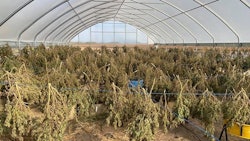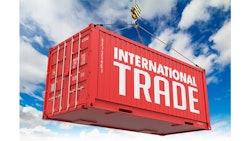
Avient Biosciences, a Wilson, N.C.-based hemp researcher and extractor of hemp distillate, isolate, crude oil and other hemp-derived formulations, has partnered with Rymedi, a life sciences and healthcare technology company based in Greenville, S.C., to implement blockchain in its supply chain. This approach will further research and development efforts by providing a database of accurate, reliable, and verifiable data.
The companies have been implementing the technology in phases and plan to have it fully automated sometime in November 2020, said Will Corbitt, Avient’s vice president of quality and compliance.
When working with Avient and using Rymedi’s technology, farmers will input information such as the coordinates of their farm, the type of seed they plant, and any insecticides, pesticides and heavy metals they use into the blockchain system, Corbitt said. “You can tell that it was planted on this day, it was tested on this day, it was harvested on this day,” he said.
RELATED: Could Blockchain Be the Next Game-Changing Technology for the Cannabis Industry?
Rymedi has worked with other hemp companies before, including farmers and extractors, said Jason Cross, Rymedi’s chief strategy officer. Members of the Avient team previously worked in the pharmaceutical sector, and their dedication to “pharmaceutical-sector rigor” excited Cross and his team.
The Benefits of Blockchain
“[There are] several key tech features of blockchain technology,” Cross said. “One is that information that's recorded on blockchain is immutable—it can't be changed! You remove all sorts of risk related to data being manipulated, data being omitted, when referencing some set of data, et cetera.” Other pluses include permissioned access and an ability to prove analysis of data “without having to divulge access to the underlying information,” Cross said.
Blockchain technology allows different entities in the supply chain to use “cryptographic keys” that provide them with access to specific data subsets. In this case, that goes for everyone from the grower to Avient’s customers, who range between companies in the pharmaceutical, nutraceutical, cosmetics and food and beverage spaces.
“There are commercial privacy reasons why parties are always hesitant to share too much, which is, ‘I might give away valuable business information. Someone could triangulate what our business plans are or even really important intellectual property,’ whether it's patented or just governed by trade secrecy, et cetera,” Cross said. “So, parties are willing to share more often because they don't have to share everything.”
Cross said having “cryptographic proof” that information was analyzed, while maintaining security, could be a boon to the hemp industry because it could allow R&D departments to do things like “analyze patient data while maintaining patient anonymity.” “But you can also—in the age of machine learning, deep learning, other AI [artificial intelligence], machine intelligence innovations— train AI models across silos of data without the training organization having access to the data itself,” he said.
“This has huge implications for making regulation more targeted, more agile and less burdensome on industry, as well as more reliable for the regulators,” Cross said. “Also, [it builds] the kind of trust that ultimately [is] valuable between supply chain partners around quality of product, around quality of processes for that product.”
Though blockchain presents numerous opportunities for companies, obtaining employee buy-in is integral to successful implementation, Cross said. “If the CTO's excited about the bells and whistles on the database side [of] blockchain, … but … the workers think it's a pain in the butt, it's not going to work,” Cross said.
And blockchain does specifically benefit employees, he said. It can reduce reliance on filling out forms that can result in employee error. It also allows a company to align itself with standards that the Food and Drug Administration (FDA) may implement; Cross said other hemp companies could “crumble” if they aren’t compliant with those standards.
Meeting Standards
An Avient press release announced the launch of a new 200,000-square-foot research and extraction facility in Wilson, which is designed for Current Good Manufacturing Process (cGMP) compliance. cGMP compliance will help when the FDA begins regulating the cannabidiol (CBD) industry, Corbitt said.
“We've got a very rigorous acceptance criteria for farmers,” Corbitt said. “They get their flower analyzed by an ISO-9001:2015 [quality management system standard], which is the latest iteration of the ISO [International Organization for Standardization] process.”
Farmers selling product to Avient will also need to get product tested and receive a certificate of analysis, Corbitt said.
“After it's all made and we've extracted it and we've sent the crude oil, distillate or isolate CBD to a third-party lab to get it analyzed to see if it meets our release specifications. Then, if it does, we can sell it,” Corbitt said.
The products’ packaging will have QR code and radio-frequency identification tags on them so Avient’s customers and trace them back to the grower and processor.
Looking ahead, Avient has another objective in view. “Our plans are to file a drug master file … with the FDA,” Corbitt said. “What that means is, we will be able to be an … active pharmaceutical ingredient—in medicine, therapeutics in the United States.”
Blockchain will help Avient provide quality-assured product to customers who must meet strong regulatory criteria of their own and have the potential to face consumer lawsuit liabilities, Cross said.
“Sourcing product that not only is the highest quality, but from suppliers that have FDA-grade pharmaceutical sector rigor in managing that quality, is the ultimate for a big pharma, big food, big cosmetic company,” Cross said.
Relying on Transparency
Blockchain will fit into Avient’s broader effort to be transparent with its business partners, Corbitt said.
“The farmer will bring their industrial hemp in here, and they will be able to come in any time they want to and look at the results through Rymedi, but if they want to see where their hemp is or watch it being processed or anything they want to do, we're going to be extremely transparent with everybody,” Corbitt said.
At the same time, Avient will also have the rights to visit its grower partners. “We work very closely with our farming partners, and we plan to give … Good Agricultural Practices [information] to them and help monitor it,” he said. “We will have auditing rights … where we could give a day's notice and show up in the field and just observe. It's about supply chain management.”
























